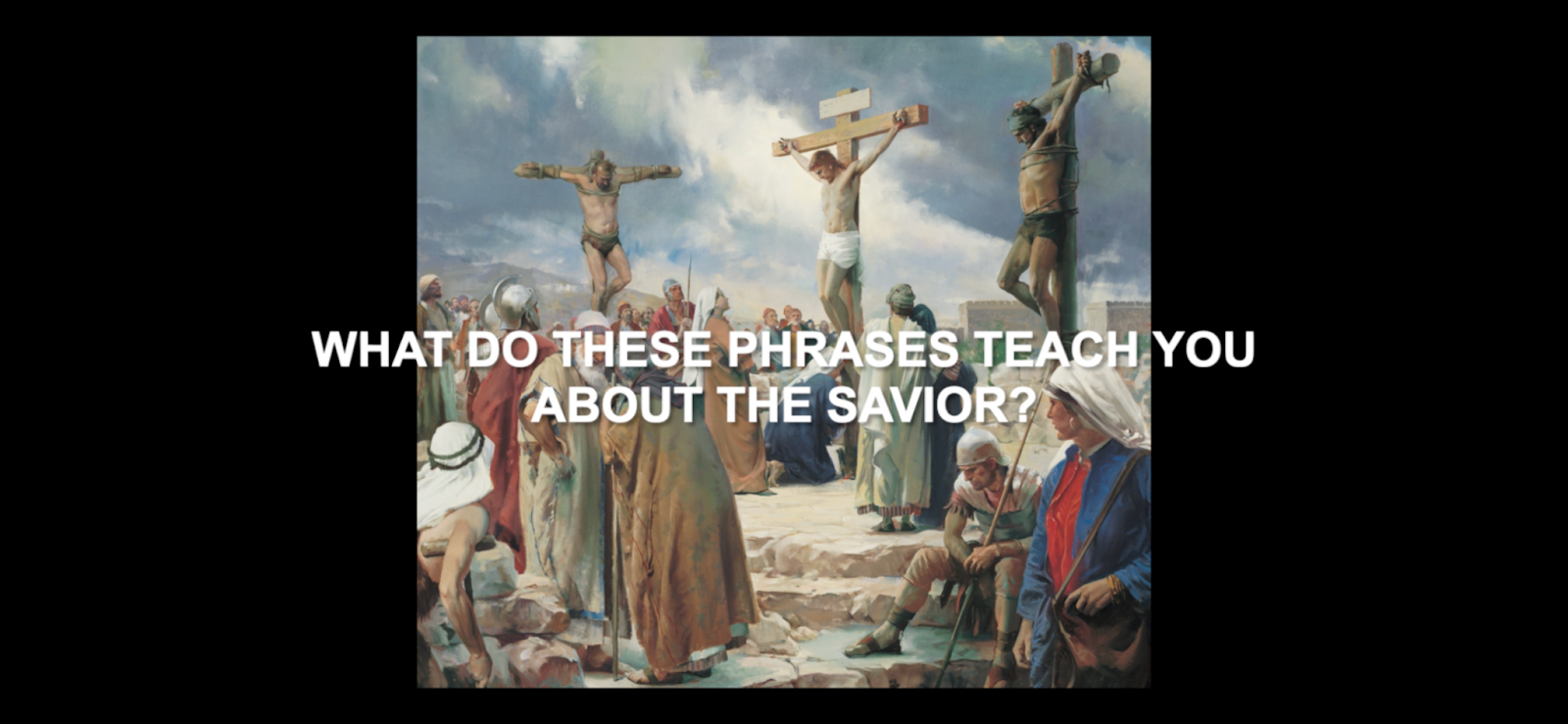Matthew 27:46
46 And about the ninth hour Jesus cried with a loud voice, saying, Eli, Eli, lama sabachthani? that is to say, My God, my God, why hast thou forsaken me?
Luke 23:34; 43; 46
34 Then said Jesus, Father, forgive them; for they know not what they do. And they parted his raiment, and cast lots.
43 And Jesus said unto him, Verily I say unto thee, To day shalt thou be with me in paradise.
46 And when Jesus had cried with a loud voice, he said, Father, into thy hands I commend my spirit: and having said thus, he gave up the ghost.
John 19:26-28
26 When Jesus therefore saw his mother, and the disciple standing by, whom he loved, he saith unto his mother, Woman, behold thy son!
27 Then saith he to the disciple, Behold thy mother! And from that hour that disciple took her unto his own home.
28 After this, Jesus knowing that all things were now accomplished, that the scripture might be fulfilled, saith, I thirst.
Discuss
These are all phrases that Jesus said, as He suffered the end of His Atonement on the cross. Reread each of these utterances and discuss what they teach you about the Savior.
Here are some ideas that we thought of:
Eli, Eli, lama sabachthani? that is to say, My God, my God, why hast thou forsaken me?
All of Jesus’s life, he had his Father with Him and supporting Him through every trial and teaching Him what He needed to know.
When Jesus was going through the pain of the Atonement, Heavenly Father withdrew His peace and comfort, from Him. For the first time in Jesus’s life He was completely alone. In the book, Jesus the Christ , James E Talmage says, “That the supreme sacrifice of the Son might be consummated in all its fulness, the Father seems to have withdrawn the support of His immediate Presence, leaving to the Savior of men the glory of complete victory over the forces of sin and death.” In other words, Christ was alone, so that you never have to be.
Then said Jesus, Father, forgive them; for they know not what they do. And they parted his raiment, and cast lots.
Jesus was forgiving to those who crucified Him. They beat Him and took His clothes, but He didn’t hate them or ask Heavenly Father to punish them. Instead He asked Heavenly Father to forgive them.
And Jesus said unto him, Verily I say unto thee, To day shalt thou be with me in paradise
Two thieves hung next to Jesus. One man thought only of himself and asked Jesus to save them all from dying on the cross. The other man said that they, the two thieves, deserved to be punished, because of what they did, but Jesus was innocent and didn’t deserve to be punished. He didn’t ask Jesus to save Him from physical death and punishment. He asked to be saved from spiritual death. In the book Jesus the Christ by, James E. Talmage, it says says, “His confession of guilt and his acknowledgment of the justice of his own condemnation led to incipient repentance, and to faith in the Lord Jesus, his companion in agony. ‘And he said unto Jesus, Lord, remember me when thou comest into thy kingdom.’ To the appeal of penitence the Lord replied with such a promise as He alone could make: ‘Verily I say unto thee, To day shalt thou be with me in paradise.’”
When Jesus therefore saw his mother, and the disciple standing by, whom he loved, he saith unto his mother, Woman, behold thy son! Then saith he to the disciple, Behold thy mother! And from that hour that disciple took her unto his own home.
Though Jesus was suffering the worst pain possible, He saw His sweet mother, Mary. He knew that she was suffering, as she watched her Son suffer. He knew that He was about to leave her, and He wanted her to be taken care of. Through His suffering, He turned to His disciple that He loved and trusted, and told Him to take care of His mother. This trusted disciple, John, took her into his home, just as Jesus asked him to do.
After this, Jesus knowing that all things were now accomplished, that the scripture might be fulfilled, saith, I thirst.
Jesus completed the Atonement for you. He completed it for me. He completed the Atonement and suffered for all of the pains and sicknesses of everyone that ever has lived and ever will live in the world. Only after He did this for all of us, did He notice His own physical needs, and He said, I thirst.
And when Jesus had cried with a loud voice, he said, Father, into thy hands I commend my spirit: and having said thus, he gave up the ghost.
The pain of the Atonement of Jesus Christ did not cause Him to die. He suffered the pain of nails being driven into His hands and wrists, He was whipped with leather that had pieces of glass and bone in it, and His body was weak and trembling. These are all things that would have killed any other human being, but the Son of God had power over death. When He had done all that He was sent here to do, He told His Father that it was finished. He told His Father to receive His spirit as it left His body, and He died.
Watch
Click the picture below to see how we did this lesson.
